WHAT’S THE MATTER WITH NOAA? – Dick Grachek
WHAT’S THE MATTER WITH NOAA?
Or: Trouble in the Un-Regulated Community
At the risk of stating the obvious: NOAA’s stock assessments are clearly inadequate.
When they are used as a basis for fisheries regulations, the entire management process becomes destructive to both the fish and the fishing industry.
We need a far more comprehensive research and management philosophy if we are to ever come close to realistic assessments and sound management.
The Extinction Delusion
Delusion is a belief held with strong conviction despite superior evidence to the contrary. (From Wikipedia)
This extinction-of-the-week approach to management is looking more ridiculous and destructive than ever. We owe it to the fish and to the fishermen to throw out this crisis-mentality management regimen which requires that researchers devote themselves to finding data that will support the crisis predisposition.
Is there a species that swims in the ocean that has not been found to be in dire need of stringent regulation? Now it’s Abalone! What happened to the “endangered” Sturgeon? Have they now recovered? And please don’t overlook the Wolffish, Cod, Haddock, Pollock, Yellowtail, Black Back Flounder, Fluke, Sea Bass, Dogfish, Skates, Red Snapper, Grouper? There must be a lament at NOAA headquarters that goes something like, “…so many species and such precious little time to find evidence of their endangerment!”
Then there’s always the Butterfish shortage which apparently is the only vehicle that NOAA could find in order to squelch fishing for the abundant Loligo Squid. Butterfish are sometimes found with Loligo Squid; however, NOAA’s Butterfish extinction watch ignores the fact (well known to fishermen) that, should they suddenly decide to surface, one could walk on the floating rafts of Butterfish from Cape Cod to Louisiana. But, there’s no need to let reality get in the way of a good campaign-to-save-a-species, even if the claimed fish scarcity is pretty much confined to the reality that exists as a construct in one of the SSC’s eccentric computer models. Scarce Butterfish is certainly not a reality that can be found in the ocean.
So, what can be done? Effective management of the fisheries is not an impossible endeavor; but a total overhaul of the attitude and thinking regarding our fisheries is essential.
Pages 2-5 will be in the comment section to save front page space!

































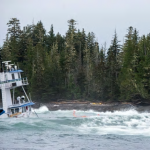
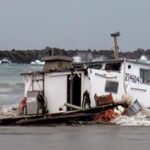
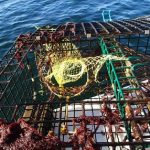

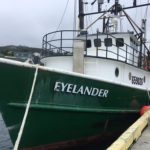

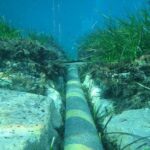

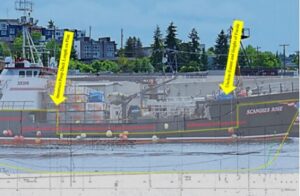
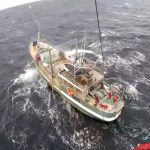



Page -2
Co-operative Research and Co-management
We need comprehensive cooperative research. A return to the scientific method would be a good place to start. The primary step in the literature explaining the scientific method is usually noted as objective observation (i.e., no predisposition, prejudice, or agenda). The “science” that NOAA bases regulations on, has clearly skipped that first step. NOAA’s prevailing underlying postulate: “Too many fishermen chasing too few fish” is a prejudice that has to be discarded by the researchers, or stock assessments will never be trusted.
We must completely revamp the entire approach to gathering fish stock data—it must be initiated with integrity, both intellectual and ethical. Fatally flawed research “science” and management is simply not acceptable. For example, as revealed during the Georges Bank Yellowtail Flounder Working Group Meeting, May 23, 2012, in New Bedford, to shut down the Yellowtail fishery based on data from survey tows that were set up to try and sample an entire eco-system with one net is clearly not sound science. This idea of sampling an entire eco-system at once is ridiculous to begin with; but it is beyond irresponsible when the data from such an attempt, gathered with a type of sweep that wouldn’t catch Yellowtail under any conditions, is used as a basis for fishery-devastating regulations.
NOAA is able to find the money for aquaculture research and start-ups and for pushing catch shares; yet, according to the Northeast Regional Science Center they lack the funds to carry out single-species surveys. So the single-species Yellowtail Flounder fishery is about to be shut down based on faulty data, collected from an errant mission to sample the entire multi-species eco-system. Yellowtail is a species essential to the groundfishery and to the scallop industry; explaining this research debacle away with a lot of bureaucratic gibberish about eco-system sampling is reprehensible incompetence and stark disrespect for the people whose livelihoods will suffer because of this—and it is an example of what the matter is with NOAA.
Stock information needs to be gathered from many sources, including the research carried out every day on the ocean by everyday working fishermen. Researchers need to go out with fishermen who happen to know where the fish are and when and how to catch them—it’s a step in the scientific method called gathering information and data in the field, in this case from people who know the field and who live and work in the field. Do the “scientists” think that they know more about finding and catching fish than the fishermen?
Research is needed that puts the researchers on fishing vessels captained and crewed by experienced, successful, and independent fishermen—fishermen who are not now, or who don't soon plan to be, on anyone's payroll but their own. Fishermen must be involved who know how to catch a particular species, know what gear to use, how to work the gear, and where and when to look for the particular species that is being surveyed and assessed. Only this kind of cooperative research will render trustworthy data.
Sound and unbiased information must then be intelligently and realistically discussed by experienced and sincere fisheries people: fishermen, scientists, buyers, and processors, etc., people who actually have a stake in the health of the resource, i.e., people who don’t make a living from declaring and preventing fisheries crises. The discussion of the information cannot be lost in a sea of meaningless acronyms and legally defensive jargon, Power Point presentations, obscure computer and statistical models, and days spent bogged down in parliamentary procedure to figure out when to start a discussion about when to start a discussion.
The conversation about stock health has to be between people whose jobs do not depend on being right, or about which regulatory tack will secure the favor of their superiors for a promotion, or what crusade will gain the most traction in the multi-million dollar donate-to-a-good-cause-Eco-Fund-businesses. Effective fisheries management cannot be based on the premise that there are “…too many fishermen chasing too few fish”.
How long can we allow these crazy prejudiced management decisions to devastate the industry and the resource? These are regulations that are based on non-existent, or if they are actually attempted, at best, groping-in-the-dark surveys, known as "data poor stocks", then processed through wackily divergent computer models—not very sound or sober management.
As a friend of mine likes to sum it up, "Garbage in…Garbage out". This is especially true when the “Garbage” data is put through a “Garbage” computer assessment model.
Notice the circular nature of the fisheries managers’ cleverly designed "perfect storm" of euphemisms: it's the "best available science", which hides slipshod and incompetent, or worse, agenda-driven data and analyses; the consequent "margin of error or degree of uncertainty" is then taken directly off the top of the fishermen’s Total Allowable Catch; and these managers’ rash cuts are completely justified, they’re simply abiding by the imperatives conjured in the "precautionary principle" in order to save the nearly extinct fish—a dire condition of the stocks indicated by (and back around to) the “best available science”.
All this jargonesque circular subterfuge sets up to mask NOAA’s underlying–and certainly unspoken–mission statement: "We don't really know what's going on out there, but no matter, our goal is to stop the species-extinguishing fishing industry anyway that we can, on as many fronts, and from as many directions as possible (we are infinitely creative regarding that, and can find all the funds needed)…so you fishermen, you pay for our incompetence, we bureaucrats get to keep our jobs, and even get promotions—you fishermen don't, and then you disappear, thank you—and the ENGO's get fat donations, the oil companies get their Outer Continental Shelf…it all works out so nicely.” As a friend characterizes this dilemma, from Vonnegut’s Cat’s Cradle:
Page-3
"Nice, nice, nice, very nice–
So many different people in the same device."
MSY: Another Delusion Or A Bureaucratic Con?
After hopefully removing the management philosophy of extinction delusion, an essential overhaul of the basic goals of management could begin by asking the obvious—but totally neglected—question, what exactly is all this management supposed to accomplish, anyway? Maximum Sustainable Yield: Stable and Sustainable Stocks, Right?
MSY will accomplish nothing more than population instability in the stocks. Engineering the taking of large fish out of a population, in some formulaic proportion to the young recruited into that particular stock, is a naive and simplistic notion of stock dynamics. It completely ignores a myriad of natural factors that affect fish survival and growth and population health.
MSY actually works against stock health because it is the large slower growing fish that stabilize a stock. MSY by focusing on counting recruits and bartering their numbers for balancing out the taking of older larger fish renders populations consisting mainly of relatively small young fast growing fish—faster growth rate, looks good on fish stock health reports, looks like the stock is improving rapidly, but faster-growth means greater oscillations and greater unpredictability over the long run. A healthy stock is a stock with a stable slower-growing multi-year class population—not a hoard of confused rampaging adolescents eating themselves out of house and home.
This simplistic MSY stock assessment philosophy results in the equally simplistic management idea that to control fishing mortality is to control the health of the fish stocks. This assumes, incorrectly, that all other factors in the fishes' natural environment are fixed or constant or non-existent. Probably, the only element in the fishes' environment that the regulators think they can comprehend, measure, and control is commercial and recreational fishing activity; so it’s “By Golly…that's where we'll focus our energy and funding!" “Overfishing! Yes, that’s it! Stop the Overfishing…by all means! Um…it’s Rampant, all over! We’ll prove it with ‘scientific surveys’!
Fire up the Bigelow, Boys!” As one can see, this creates a great many bureaucratic jobs.
Again, it’s apparent that NOAA is assessing and managing the stocks to the forgone conclusion that the stocks are in dire shape since the scientists can't find any fish, and they can't find any fish because they're all gone; and they're all gone because the handful of fishermen that are left (after catch shares consolidation), are overfishing. Brilliant!
Actually, MSY is quite effective and does work very nicely—for the regulators, not for anything else. It works by giving them a self-serving bureaucratic justification for their job; and it provides NOAA’s Non-Government Organization “partners” a sweet platform for donation harvesting. It’s simple: just stop the overfishing that is indicated by the MSY based analyses.
This management approach belongs in the same say-anything-to-save-your-pie category as Lubchenco's declaration that BP’s Gulf spilled oil disappeared because of the warm water and hungry resident bacteria (after a mammoth 200m gallon spill and after months of spraying millions of gallons of toxic dispersants—at night); or how about the dead turtles that washed up on Gulf beaches in January were due to shrimpers not using their turtle excluder devises. Shrimping was impossible after BP’s Spill. The turtles and Dolphin, along with many other creatures, washed up on Gulf beaches all winter after the BP spill; however, fishing only opened for the season in April, four months after the dead turtles were found. Now after a recent storm we’re starting to see on the beaches some of the oil the bacteria must have missed, and the truth about the condition of that productive fishing area.
That's how the fishermen think here in Florida too. I listen to them talk about the snapper being up to this line or that line, when before they were down south only up to this line, and such. They now what is going on in the water because they live there. Pretty basic common sense. If they just ask the right questions the fishermen could give them all the data they want.
Pg 4/5
A Better Idea: Respect the Resource and Respect the People Who Feed You.
“[There is a]…critical role that sound science and good governance —that is, inclusive, transparent co-management between government, and industry and stakeholders — plays in ensuring the sustainability of fisheries.” Ecotrust Canada (intro. to “A Cautionary Tale”)
The fisheries can be successfully managed. With integrity, common sense, and clarity of purpose it can be done. Fishermen understand that successful effective management is absolutely necessary for survival; but micro-management is impossible. The problems managing the complicated North East Multi-Species Fishery have to do with some very unrealistic ideas about fish and fishing at NOAA. Fisheries problems that are attributed to dwindling stocks and uncooperative rogue fishermen mis-reporting their catch are, in truth, most often created by this huge, detached, despotic, and external agenda-driven, mismanaged NOAA bureaucracy, unwieldy, inflexible, overwhelmed, confused, and inept.
Fishing cannot be managed from sound-bites or marketing slogans created by environmental organizations with a prejudice and an agenda. Good scientific observation, accurate stock assessments, and intelligent co-governance do not result if there is a predisposition or a given blind allegiance to the postulate that “the fish are endangered due to illegal and immoral overfishing”.
Fishing also cannot be managed from an academic economist’s or biologist’s point of view only. Fishing is a multi-faceted issue and requires a multi-discipline approach, including sociologists, social-psychologists, social-anthropologists, and social-historians, and especially must include the fishermen and fish handlers whose lives will be directly and sometimes drastically affected by the outcome of the regulation decisions. The words men and women, the humans have to be put back and coupled with the term “fishers” (the neutered and dehumanized term so favored by the anti-fishing theorists). Fishing is an interaction between fish and people.
The issues and problems facing the fishing industry are not insurmountable; but there needs to be HONEST communication about the purpose and long term goals for the fisheries. There can’t be hidden corporate agendas or personal ambition driven politics if the management endeavor is ever going to succeed in preserving the resource and the fishing communities.